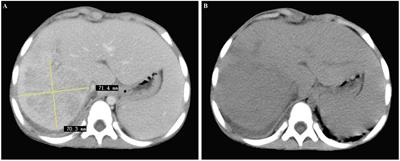A case report of IgG4-related hepatic inflammatory pseudotumor in a 3-year old boy
Background: Hepatic Inflammatory Pseudotumor (IPT) is an infrequent condition often masquerading as a malignant tumor, resulting in misdiagnosis and unnecessary surgical resection.

The emerging concept of IgG4-related diseases (IgG4-RD) has gained widespread recognition, encompassing entities like IgG4-related hepatic IPT. Clinically and radiologically, corticosteroids and immunosuppressive therapies have proven effective in managing this condition. Case Presentation: A 3-year-old Chinese boy presented to the clinic with an 11-month history of anemia, fever of unknown origin, and a tender hepatic mass. Blood examinations revealed chronic anemia (Hb: 6.4 g/L, MCV: 68.6 fl, MCH: 19.5 pg, reticulocytes: 1.7%) accompanied by an inflammatory reaction and an elevated serum IgG4 level (1542.2 mg/L). Abdominal contrast-enhanced computed tomography unveiled a 7.6 cm low-density mass in the right lateral lobe, while magnetic resonance imaging demonstrated slight hypointensity on T1-weighted images and slight hyperintensity on T2-weighted images, prompting suspicion of hepatic malignancy. A subsequent liver biopsy revealed a mass characterized by fibrous stroma and dense lymphoplasmacytic infiltration. Immunohistochemical analysis confirmed the presence of IgG4-positive plasma cells, leading to the diagnosis of IgG4-related hepatic IPT. Swift resolution occurred upon initiation of corticosteroid and mycophenolate mofetil therapies. Conclusion: This study underscores the diagnostic approach to hepatic IPT, utilizing histopathology, immunostaining, imaging, serology, organ involvement, and therapeutic response. Early histological examination plays a pivotal role in clinical guidance, averting misdiagnosis as a liver tumor and unnecessary surgical interventions.
Read the full article at the original website
References:
